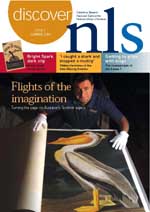Blogs and technology in the National Library of Scotland's 'Discover NLS' magazine
Having just spent a weekend with librarians trying to understand how their discipline fits into the digital world, I chuckled when I saw this article on CNet - "Most reliable search tool could be your librarian". The National Library of Scotland in particular is doing a lot to address the challenges that digital media present to the traditional librarian.
When I recently toured the library, we were given a pack with lots of information about the services provided, and the first two issues of the library's magazine "Discover NLS".

The facts behind the launch of the magazine were laid out in the opening foreword by Alexandra Miller:
NLS is a world-class research library yet it is still relatively unknown in its own country. A year ago [2005] we conducted a survey that showed that only twenty per cent of the general Scottish population had heard of their National Library.
A couple of the articles in the first two issues grabbed my eye as they touched upon technology - particularly Gill Hamilton and Eric Jurtzenka's article "Getting to grips with blogs: the manuscripts of the future?". They make the point that several significant historical documents have taken the form of diaries over the years, and give a straightforward and simple introduction to the topic. Libraries have had a difficult time coping with the expolsion of digital media, but blogging has certainly appeared on their radar.
As part of the Library's policy for collecting digital materials published in or about Scotland a collaborative project, the UK Web Archive, has been established. The project will explore the issues surrounding the collection of websites and test how these can be recorded and preserved, so that they continue to be accessible in the future. Several Scottish blogs have been archived by the project, including the satirical paper Woolamaloo Gazette and Charles Stross's Accelerando.
Despite not being a hypertext document itself, the blogging article in Discover NLS has a box-out with a list of web resources mentioned in the content. The library itself also has tested the waters with an internal blog of its own.
The NLS has also been selected and funded to build a 'Trusted Digital Repository' as part of a digital strategy to put as much archivist expertise into preserving digital material as there is into preserving physical analogue material. Issue Two of 'Discover NLS' features a whole item on digital archiving called 'Total recall: beating the Betamax syndrome'.
Najila Semple of the Digital Preservation Coalition talks through some of the pressing issues with this kind of binary material. She points out perhaps one of the key ones:
it is more cost-effective to manage digital materials from the start, preferably at the creation of the resource
This is the kind of lesson that the BBC has gradually learned, by enforcing filename conventions in the newsroom so that digital rushes can be retreived with ease. Although, as I observed on my trip to Windmill Road, digital preservation of analogue content by re-versioning isn't immune to the Betamax factor - the D3 format the BBC was using to build their digital archive is in danger of becoming obselete itself.
In the first issue of 'Discover NLS' there was another article dealing in this subject area - 'The role of libraries in the digital age'. In this Simon Bains and David Dinham made a couple of key points to refute the oft-mooted notion that public libraries will be dead within the next 15 years or so. Firstly they note that:
It is easy to be deluded into thinking that 'everything's online these days'...However, huge amounts of data remain only in 'analogue' form, and much digital information, for reasons of copyright and cost, is hidden from search engine 'crawlers', and thus invisible to internet searchers in what is known as the 'deep web'. Kibraries of all types maintain subscriptions to these sorts of resources and offer access to their users, who would not otherwise be able to use them
Secondly they add that:
Many internet searchers will also have experienced the frustration that the result that looked most useful has, in fact, disappeared without trace...Digital objects generally are subject to loss and degradation, just the same as printed material, the crucial difference being that you cannot get away with hoping for the best...with luck, acid-free paper and good weather conditions, a book might still be on a shelf, and legible, a hundred years after it was placed there. A digital object, conversely, will not necessarily still be accessible.
I'm pleased to see that so many people at the NLS are already thinking about, and getting funding for, policies that will hopefully guarantee the availablility of today's digital assets in the future. And they seem to "get it" as well - if you want to read the magazine in full then it is available online.